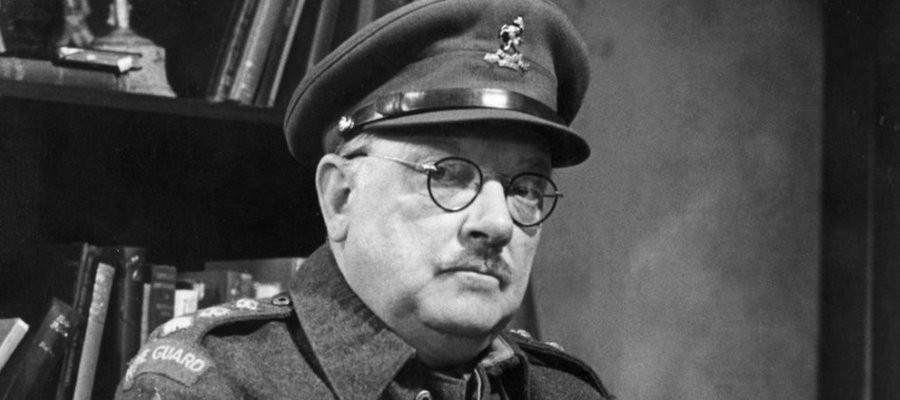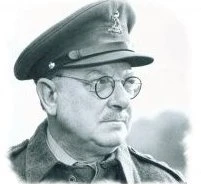
Arthur Lowe
For years Arthur Lowe entertained television viewers with any number of pompous characters in a range of shows from straight-laced soap operas to outright slapstick comedies. An accomplished actor, Lowe is best remembered for his roles in comedy where he could get more laughs by the raise of an eyebrow or a subtle hand movement than most actors could get out of whole sentences. However, in private Lowe was not filled with the laughs he so easily gave to others. He allegedly struggled with depression, anxiety and unease at being in the public eye. Sadly, these factors and a wife whom some considered something of a Svengali finally reduced a once brilliant career to one spent on the stage in small productions outside of London.
Arthur Lowe was born in Hayfield, Derbyshire on September 22nd 1915. He grew up in Manchester, the only child of Arthur Lowe (a booking clerk at a local railway station) and his wife Mary. After school he found work in small shops and factories. Arthur's original intention was to join the Merchant Navy but this idea was thwarted due to his poor eyesight. At the age of 23 he quit his job at an airplane factory to become a cavalry trooper in the Duke of Lancaster's own Yeomanry. Having previously worked as a stagehand at the Manchester Palace of Varieties, Arthur was confident enough to take part in shows put on for the troops.
While stationed in Alexandria, Egypt, he and his superior officer set up a theatre where Arthur learned to mimic his superiors. He also invented a German character called Colonel Von Kramm, whose catchphrase was "Velcom to our wahr." Those who served with him say that in hindsight they could see in him even at this early age all the personality traits of the character that would later make him famous. He could be standoffish, pernickety and wanted everything done by the book. This was a turning point in his life. Although he had enjoyed his previous experience at the Palace of Varieties he had never seriously considered an acting career. But now, almost 30 years of age, he knew what he wanted to do when he had completed his military duty. His parents were not thrilled with the idea but nevertheless his father, who as a booking clerk had arranged rail travel for a number of touring theatrical companies, used his contacts to get Arthur an introduction to Frank H. Fortescue at the Hulme Hippodrome in Manchester. The intention was for Arthur to get the acting bug out of his system before settling down to a 'proper job.' So on a cold January morning Arthur arrived at the theatre wearing riding breeches, a heavy greatcoat and shivering from the cold. The first play he did was 'Flare Path' and performances ran twice a night with a new production every week. Whilst at the Hippodrome Arthur met an actress named Joan Cooper, who reportedly took one look at Arthur and told one of her friends, "I think I'm going to marry him."
There was a slight problem with her plan, however. Joan was already married and she also had a five-year old son. Nonetheless she and Arthur began an affair that Arthur later confessed to Joan's husband -who agreed to a divorce. Arthur and Joan were eventually married in 1948. By that time Arthur had gained vast experience in the theatre and whereas Joan was originally the more experienced and considered by most to be the better actor, Arthur soon began to get more noticed. In 1946 the couple moved to the London area in order to further Arthur's career, their aim was to get into a repertory company with an eventual goal of landing a part in a West End production. Joan then became pregnant and gave birth to their son Stephen. Motherhood caused her to give up her career, and it was left to Arthur to support the family.
By 1950, after a number of short tours and a season at Hereford agents were beginning to take notice of Arthur and he was offered several small film parts and radio broadcasts, including a reporter in the Alec Guinness film Kind Hearts and Coronets and a short stint on the radio show Mrs Dale's Diary. In 1951 he made his television debut and in 1952 he also auditioned for Jack Hylton who was putting on a production of Call Me Madam at the Coliseum in London's West End. Roles in Pal Joey and The Pyjama Game followed. Then, in 1960 Arthur was offered three episodes of a new series for Granada Television. The part was Leonard Swindley in Coronation Street and Arthur would play the role for the next seven years. What was a good move professionally turned out to be something of a bad move personally. The part of Swindley made Arthur easily recognisable in the street, and this to an intensely private man came as something of a shock. He hadn't realised yet the power of recognition that television could bring and although the role gave him financial security he grew to hate the character. All the more surprising then that after quitting 'The Street' he revived Swindley for the sitcom Pardon The Expression. Fame also placed pressure on his marriage. Joan stayed in London most of the time with the children, and to relieve the loneliness she began to drink. She felt that television was a waste of her husband's talents, but in reality she missed being able to live vicariously through him. She had always thrived on the opening night parties and social gatherings associated with the theatre, but television programmes didn't have these. She began to miss her own acting career.
In 1966 Arthur decided he'd had enough of Swindley, and a hectic work schedule, an inability to deal with the trappings of celebrity, and a pressure-filled home life caused Arthur to sink into a severe depression. Joan was also unhappy and with the children getting older she decided that she would like to return to work. But job offers for Joan were not easy to come by. For therapy the couple bought an old steam yacht and, with the aid of original plans from the National Maritime Museum in Greenwich, they set about restoring it. Eventually they made the craft seaworthy.

Then in 1967, Arthur was invited to lunch at the BBC by David Croft and Jimmy Perry who were planning to write a series set in the Second World War, featuring the antics and misadventures of the Home Guard. Arthur was wanted to play the central role of Captain Wainwaring in a series to be called Dad's Army. It was later revealed that Arthur was third choice for the part (Jon Pertwee was one of those who declined the role), but for fans around the world it is now impossible to think of anyone else as Mainwaring. His portly, no-nonsense appearance combined with his impeccable comedic timing and priceless looks were essential to make this role as memorable as it was. "As I got to know Arthur the man more and more it became obvious that Mainwaring had been waiting for him, and Arthur for Mainwaring," his Dad's Army co-star Bill Pertwee (Warden Hodges) once wrote. "The two fitted like a split screen merging into one. The first time I dined with Arthur in a restaurant, he said to the waiter, 'The Warden will sort out the bill.' This was clearly Mainwaring the character overlapping with Arthur the man and he was fully aware that this remark would amuse the other diners." In spite of the success of Dad's Army, Arthur's wife was still not happy. Her career had not panned out as expected and she began drinking again. To help her out Arthur asked Croft and Perry to create a part for her in the show. So she was given a small role as Private Godfrey's sister Dolly.
Apart from the television role in Dad's Army, Arthur was gainfully employed in theatre, voice-overs, reading children's stories and a radio series. He even managed to fit in the occasional film role. He then portrayed Louis Pasteur in the medical drama The Microbe Hunters and appeared at the Old Vic in The Tempest with Sir John Gielgud. When Dad's Army finally finished in 1977 he played Home Secretary Herbert Morrison in Granada's Philby The Traitor.
In 1978 Arthur was offered a new series for BBC called Potter followed by Bless Me Father for London Weekend Television. In this he played Father Duddleswell, an Irish priest who was forced to deal with a young novice curate named Father Neil Boyd. The scripts were by a real-life former novice curate named Peter De Rosa and allowed Lowe to give another characteristic performance very much in keeping with his recognised comedic style. After the end of Bless Me, Father, Arthur began to tour in theatrical productions with his wife. It finally got to the point where he refused to work without her. In the process he declined numerous West End roles and even a part in the Warren Beatty film Heaven Can Wait. Instead he ended up doing lesser theatrical productions and the occasional bit part on television.
In April 1982 Arthur and Joan were in Birmingham appearing in a production of the play Home At Seven. He had already done a matinee and several radio and television interviews. Before the evening performance he collapsed. Since he had suffered from narcolepsy for years his wife was convinced that he'd just fallen asleep and would wake up. She was wrong. He had suffered a stroke and after being rushed to the hospital died early the next morning. Whether it was denial or her strong belief that the show must go on, Joan didn't miss a performance and was in Belfast doing the play when Arthur was laid to rest. In fact, there were very few present at the funeral, perhaps a sad testament to Arthur's inability to let people get close to him. Joan passed away in 1989 having spent the last years of her life in retirement in the village of Hayfield in the house where Arthur spent his childhood.
Two biographies on Arthur Lowe are available, Arthur Lowe - Dad's Memory by his son Stephen which was released in 1997 and more recently Arthur Lowe by Graham Lord. Looking back on his parents relationship, Stephen wrote that love was like a 'destroying angel' because it didn't allow either of them to achieve their full potential. In a little over twenty years Arthur Lowe appeared in over fifty films, was constantly in demand, and reached the top of his profession when he created one of the most enduring roles on television. In the process he coined a national catchphrase ('stupid boy') that is still uttered today with the adoption of Captain Mainwaring's pompous tone. For someone who didn't reach his full potential, that's pretty good going.
Published on February 20th, 2019. Written by Laurence Marcus (22 August 2004) for Television Heaven.

